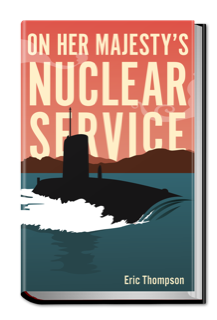Immortality
The mark of true genius is that one's work is immortalised. It can be immortalised in many differing ways: as a fundamental scientific principle (Pythagoras and Einstein), a world changing invention (Watt's steam engine); inclusion of word or deed in the language as a figure of speech (Nelson putting his blind eye to the telescope); the continued publication of a book long after the death of the author (Walter Scott, Charles Dickens); the continuous performance of plays (Shakespeare); the eternal popularity of music (Beethoven and Mozart) or the ever increasing value of a painting (Michelangelo and Rembrandt) etc etc. Such immortals fill the Pantheon of Humanity.
Robert Burns has been immortalised in so many ways: the universal singing of Auld Lang Syne to end a celebration; quotations embedded in the English language - 'The best laid schemes of mice and men' 'man's inhumanity to man' etc; the number of his songs still popular today 226 years after his death; the astonishing number of Burns Suppers held globally on 25th January, the anniversary of his birth, (not even Shakespeare gets that), and the number of Burns Club around the world. His immortality is such that his poetry has been adopted by such widely differing societies as Communist Russia and free democratic America. Why? Because his observations on humanty stand the test of time.
In human observation, Burns excels. The moral of Tam O' Shanter is: 'Don't drink and drive.' 'The Twa Dogs', the first poem in his original Kilmarnock Edition, is an enduring satire on the differences between rich and poor, as seen through the eyes of a wealthy man's gun dog and a poor shepherd's working collie. Burns could destroy antagonists with the power of his pen, as in the excoriating lampoon, 'Holy Willie's Prayer', the ultimate exposure of hypocrisy. Or his demolition of pretension as in 'To a Louse'- 'Would some power the giftie gie us to see ourselves as others see us.' Or his anthropomorphisation of calamity, as experienced by a field mouse: 'The best laid schemes of mice and men go oft astray.' Or in his measures of true human worth in A Man's a Man - 'The honest man the' e're so poor, is king o' men'; 'The rank is but the guinea stamp, the man's the gold'; and, 'Man to man the world o'er shall brothers be.'
Another measure of immortality is permanent relevance. Most of Burns great poems on the human condition are as true today as when he wrote them over two hundred years ago. It occurred to me, for example, that his satire, 'The Twa Dogs', fitted perfectly, the situation at Faslane where the massive Government-backed nuclear submarine base stood on one side of a high security fence while the shambles of a so-called 'peace camp' sat on the other. So, with little change required, I amended it to suit and performed it at a Dinner in the Wardroom (officers' mess) at Faslane. It was so well received that later I converted 'Holy Willie's Prayer' into 'The Commander's Prayer' in which I lampooned the Base Executive Officer. (see below for both). My point is not that I presume to emulate the immortal Burns but that he had provided ready-use ammunition 200 years after his death.
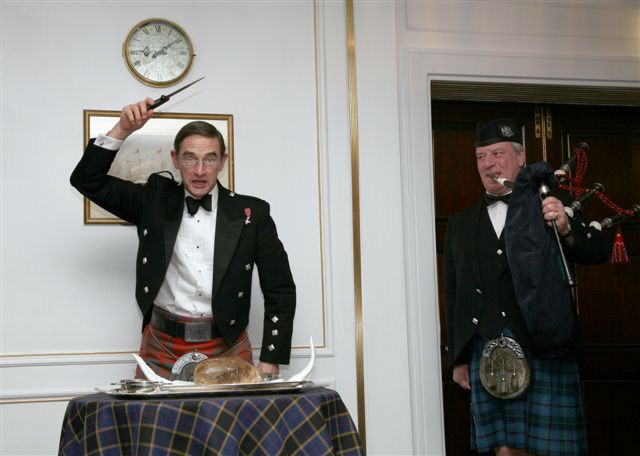

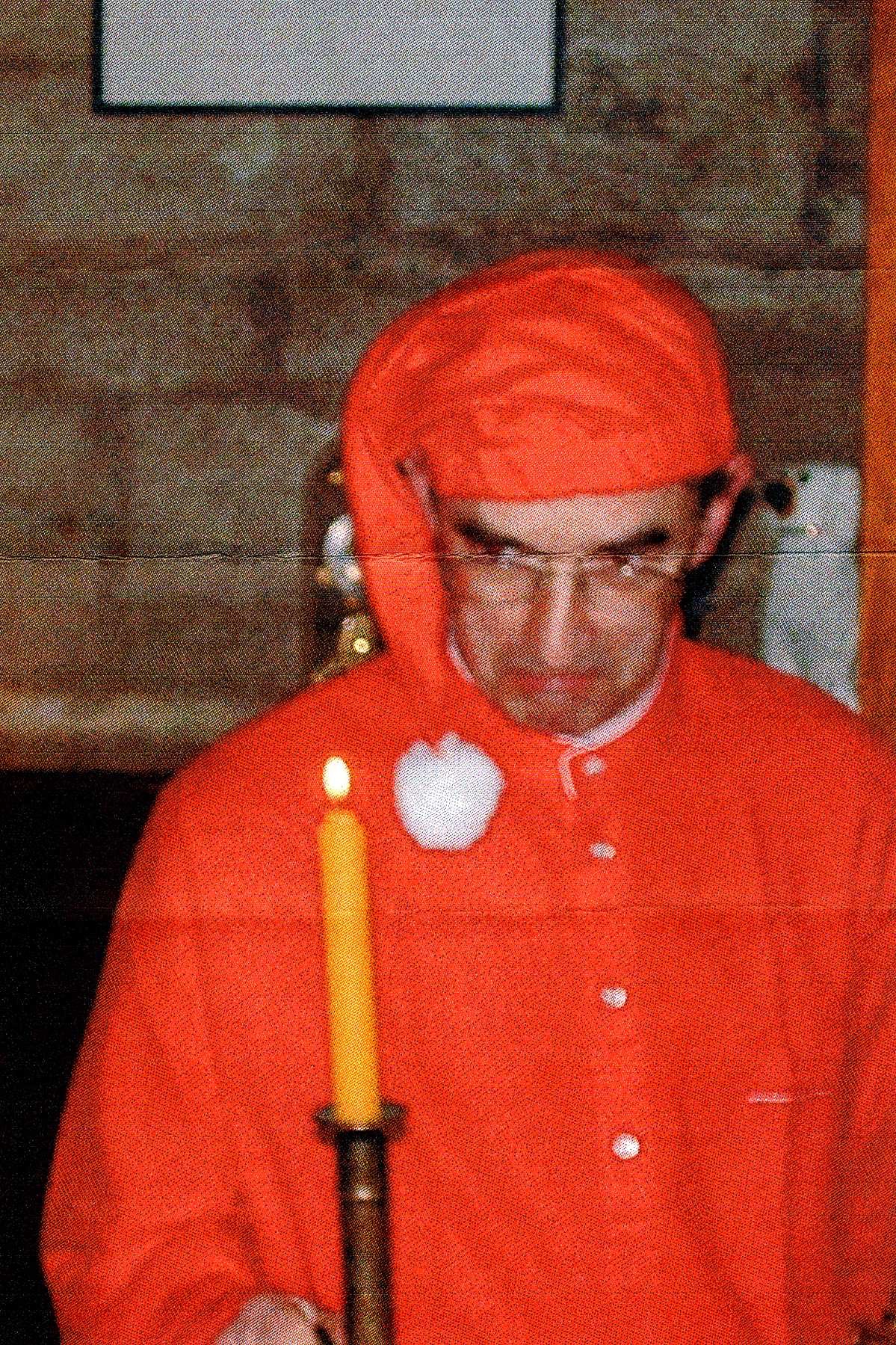
'ALLY SHANTER'
Click on the arrow below to view my performance of 'Ally Shanter' at the Bachelors Club in Tarbolton, Ayrshire, founded in 1870 by Robert Burns. 'Ally Shanter', written by me, is a faithful parody of Burns' comic masterpiece, 'Tam O' Shanter', but reset in the context of Glasgow's Rangers v Celtic football rivalry. The atmosphere in the Bachelors Club that night was uniqu. One felt as if one was in the presence of the Bard himself. The audience were fellow members of the wonderful Bridgeton Burns Club.
'Ally Shanter' won the BBC Radio Scotland Burns Poetry Writing competition in 1996. My prize was a bottle of Glenfiddich.
(Please note: clicking on the arrow will lead you into Youtube but will not return you to my website. I need to figure out how to prevent that. In the meantime, all one has to do is re-enter my website by the front door.)
The Twa Dogs o' Faslane
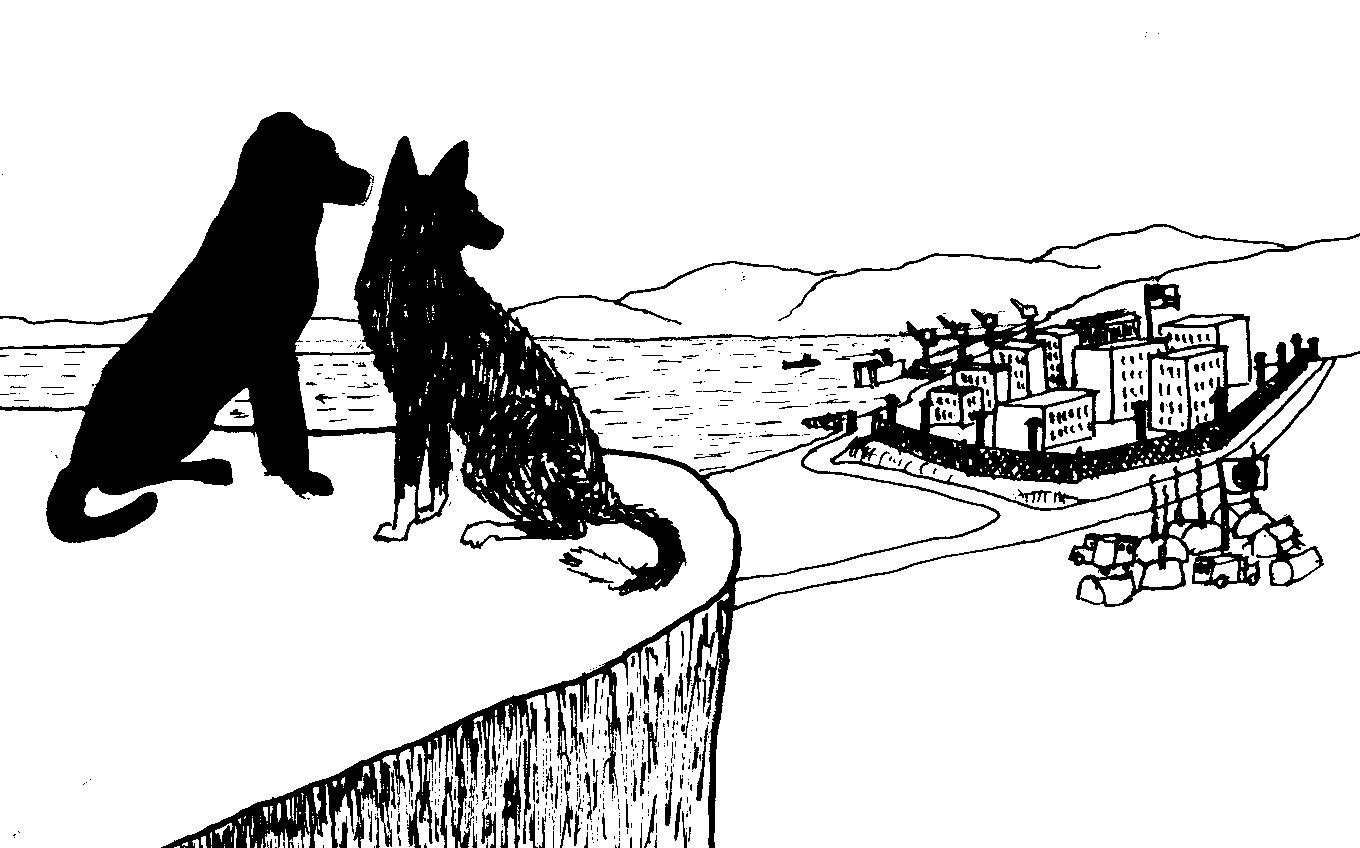
‘Twas in that place of Scotland’s Pride
That bears the name of auld COMCLYDE (1)
Upon a bonnie day in June
When wearin’ through the afternoon
Twa dogs, that werena missed frae hame
Foregathered once upon a time.
The first I’ll name, they ca’d him Caesar,
Was keepit for the Commodore’s pleasure;
His hair, his size, his mouth, his lugs,
Show’d he was none o’ Scotland’s dugs,
But came frae some place far abroad
Where sailors go to fish for cod.
His locked, letter’d, braw brass collar
Shew’d him the gentleman and scholar;
But though of highest pedigree,
Nae hint of pride, nae pride had he.
But wad hae talked wi full proprieties
To a’ Heinz 57 varieties.
The other was a protester’s collie,
A rhyming, ranting, Peace Camp wallie
Who for his friend and comrade had him
And in his freaks, had Luath ca’d him.
He was a rough and faithful tyke
As ever leapt a ditch or dyke
His honest, sonsie, bawsent face
Aye gat him friends in ilka place.
Nae doubt these dogs were thick thegither
And unco fond o’ one anither.
Wi social noses, sniff and snuffle
They’d watch the police and campers scuffle
Until wi’ pleasure weary grown
Upon a knowe they sat them down
And there began a long digression
About the lords of the creation.
CAESAR
I’ve often wondered, honest Luath
What life poor Peace Camp dogs like you have.
The Navy life is such a skive
But how do Peace Camp folk survive?
COMCLYDE gets rich remuneration
And house supplied by gratefu’ nation.
He rises when he likes himsel’
Whilst Reggies give his ratings hell. (2)
He calls his car, he calls his driver,
Another state enlisted skiver,
And at the Base he turns up late
But’s aye saluted at the gate!
From morn till e’en the chefs are toiling
At baking, roasting, frying, boiling;
And though the Wardroom eat like kings, (3)
The junior rates are well fed things.
Police alsatians, blasted bullies,
Get food that floods their mooths wi’ droolies
But what about a Camper’s diet?
I’ll vow my master wouldnae try it.
LUATH
Truth, Caesar, his life is tough.
His tents and vans are truly rough
But his is a Council aided mess
Subsidised by the DSS. (4)
Himsel’, and wife, he thus sustains
And now he’s even having weans!
Ye must well think, a wee touch longer
And they must starve o’ cold and hunger;
But how it comes, I never kent yet.
They’re maistly wonderfu’ contented.
Ah, hairy men and burly hussies
Are bred in such a way as this is.
CAESAR
But then to see how ye’re neglected
How cuffed and kicked and disrespected.
Lord, man, COMCLYDE treats his yellow wellies
Wi’ more respect than Peace Camp smellies.
I’ve noticed on their break-in days,
And they’ve breached yon fence in many ways,
Peace Camp laddies short o’cash,
Get apprehended just like trash
And ta’en away by Strathclyde Police
And fined for breachin’ o’ the peace!
I see how folk live that hae riches;
But surely Camp folk maun be wretches.
LUATH
They’re no sae wretched’s ane would think
Though constantly on breadline’s brink.
They’re sae accustomed to the fight
The Navy gi’es them little fright
An’ though fatigued wi’ unemployment
They find that rest’s a sweet enjoyment.
They lay aside their private cares
For international affairs.
They sacrifice to gain attention
For Britain’s good is their intention.
CAESAR
Haith, lad, ye little ken about it:
For Britain’s good! - good grief! I doubt it.
Say rather, simple fools
Used as politicians’ tools
Manipulated for the gain
Who’d soon forget these faithful minions
To suit a shift in mass opinions.
Sheridan and Galloway,
They only turn up on the day
To get their photies in the press
Then leave you to your filthy mess.
Ha! For Peace on Earth with Trident trifle!
They’d also have to ban the rifle!
LUATH
Hech man! Ten million pounds for yonder fence!
Is that what your lot call Defence?
But will you tell me Master Caesar?
Sure Wardroom life’s a life of pleasure.
Nae cauld nor hunger e’er need stir them.
The very thought o’t needna fear them.
CAESAR
Lord, man, were ye whyles where I am
The Wardroom - ye wadnae envy them!
It’s true they neednae starve or sweat
Thro’ winters cauld or summer’s heat
They’ve nae rough work to craze their bones
And fill auld age wi’ gripes and groans
But human bodies are such fools,
For a’ their colleges and schools
That, when nae real ills perplex them,
They find the stress enough to vex them.
And aye the less they have tae pain them,
In like proportion, less will hurt them.
The gentlemen, and ladies worst,
Wi’ downright want o’ work are cursed.
They loiter, lounging, lank and lazy
With duties which are pretty hazy.
Their days insipid, dull and tasteless;
Their nights unquiet, long and restless
And e’en their sports, their balls and races,
Their gadding about in public places.
There’s so much fuss, such pomp and art
The pleasures scarcely touch their heart.
The men dress up like high class dames
Then rip their clothes in daft mess games.
Ae night their mad wi’ drink and whoring
Next day their life is past enduring.
There’s some exception, man and woman,
But this is Wardroom life in common.
By this the sun was out o’sight
And darker gloaming brought the night
When they got up and shook their lugs,
Rejoiced they werena men but dugs.
And each took off his separate way
Resolved to meet some other day.
1 COMCLYDE - Comander of the Faslane nuclear submarine base
2 Reggies - Naval Regulators (police)
3 Wardroom - Officers’ Mess
4 DSS - Department of Social Security
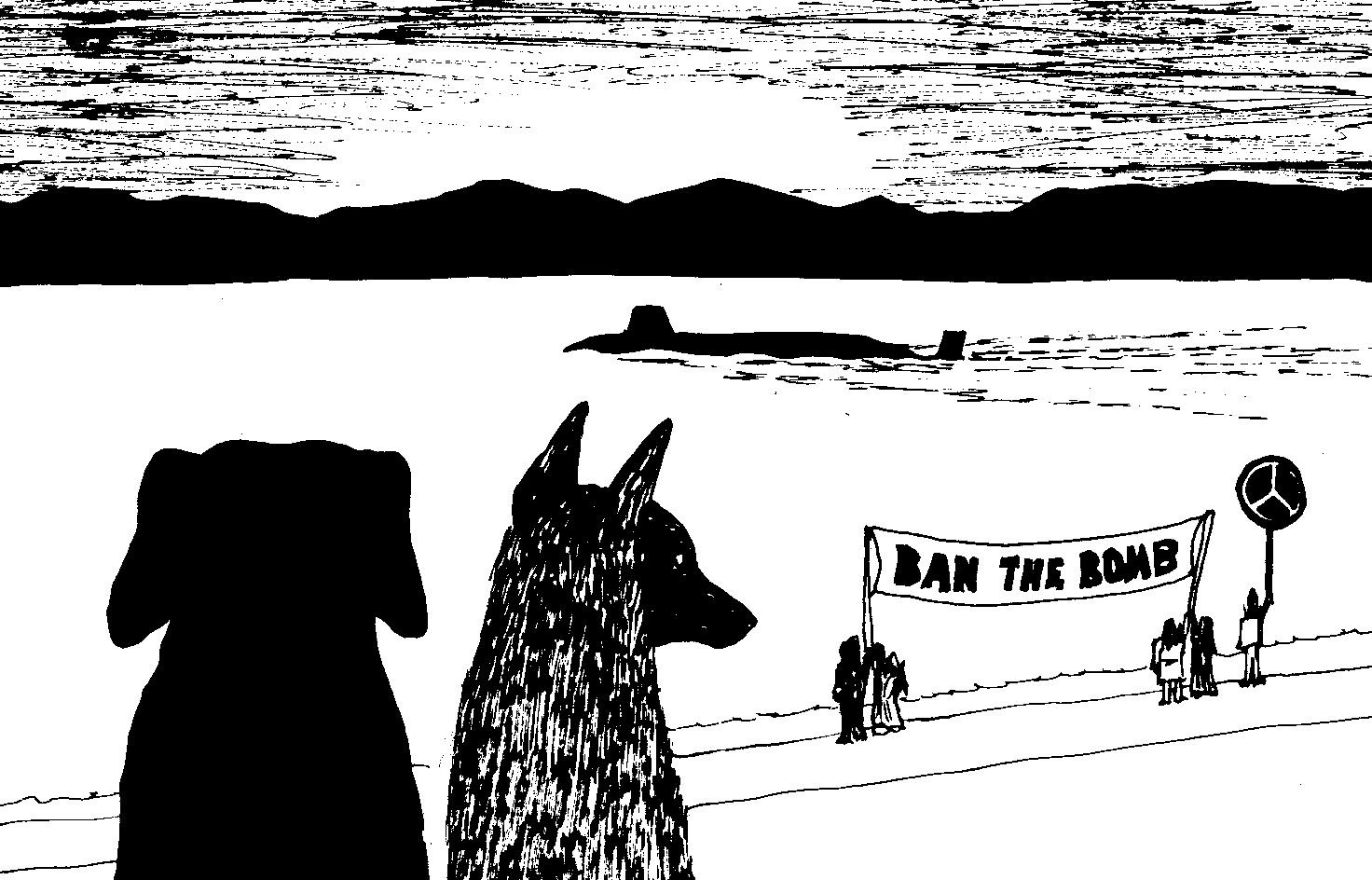
The Base Commander's Prayer (after 'Holy Willie's Prayer')
Written in jest for the dining out of the Commander of HMS NEPTUNE, President of the Wardroom Mess and Base Executive Officer. He was a great friend and had excelled by being promoted from the ranks but was a wee touch rank conscious.
WARNING: This is in the language of a barrack room ballad and was writtten when females in the Navy were members of the Woman's Royal Naval Service (WRNS) and known as Wrens or 'Jennies'. It was also written before political correctness took hold. For the record, the ladies could more than hold their own.
O Lord, who in the Heavens doth dwell
Who, as it pleases best thysel
Sends one tae Guzz and one to hell, (1)
To serve our Queen.
And no because they've served Her well
Where'else they've been .
And Thou, O Lord, from all the rest,
Have chosen no to send me West
But sent me North to face my test,
Your Lord's anointed.
Thou kent fine well I was the best,
By God appointed.
When Thou gie'd me this great status
It caused Nav. Sec. a wee hiatus, (2)
For D.N.O.A. didnae rate us, (3)
But I had class.
And now this lot will have tae fête us
And kiss my ass.
Why me, O Lord, I need an answer?
Me, a simple SD chancer (4)
Who, in jest, sought GL transfer (5)
To please the wife,
Who acts like Hitler's leading Panzer
And rules my life.
But sauce for goose is sauce for gander
And last time she got up her dander,
I warned her that I could have banned her
From the Mess!
For, thank Thee Lord, I am Commander
In this Base
In dining out this final night,
I pray, O Lord, with all my might
This stingy Mess will no be tight,
On gifts and praise
For always being in the right
Throughout my days.
And here am I, the chosen sample,
To show thy power on Earth is ample;
The very pillar of thy temple
My God's own Ace,
Guide, counsellor and example
To a' thy Base.
Thou knows right well what zeal I bear
When drinkers drink and swearers swear,
And women flash their breasts all bare,
Both great and small.
In front o'me they would not dare.
I ban them all.
Through every passage in this Mess.
I tread the paths of righteousness
My God, you'd stand for nothing less;
No sign of weakness.
But, Lord, a sin I must confess
Wi' fearful meakness.
Yes, Lord! Confess I must.
For Thou, I ken, will have me sussed.
At times I'm siezed wi' fleshly lust.
And cannae cope.
For when I see a woman's bust
I want to grope.
Lord, Thou kens last week I stumbled
When in a Jenny's blouse I fumbled (6)
And to the floor in shame we tumbled
To my dishonour.
Then, whilst my fevered brain was jumbled,
I was upon her.
Please, Lord, accept this humble plea
That when, across my wanton knee,
I pulled the WPC (7)
Whose arse I kissed,
Thou knows this wisnae really me
For I was pissed.
But maybe, Lord, it was thy plan,
When man and woman first began,
To tantalise the wicked man
Wi' women risqué,
Then drown his manhood from a can
O' guid Scotch whisky.
O Lord, bless thy chosen in Faslane
Who serve here in thy gentle rain,
But damn all those who gie me pain
And cause me grief.
They're wearing dolphins in the main. (8)
And all called 'Chief'.
And free us from our woman members
Who're here in ever rising numbers
Waking men from honest slumbers
Wi' shrieks and squeals
And stoking up their dying embers
Wi' furtive feels.
O Lord, Thou knew that Jack and Jill
Would have their oats whilst up the hill.
I thank Thee for the cap and pill,
Contraceptive wonders,
Which save me from a massive bill
For sexual blunders.
And hear this cry of earnest pain.
Some bastard here has nicked my cane (9)
Without which, though this may sound vain,
I cannae swagger.
Lord, if I find it with a Wren,
I swear I'll shag 'er.
Last thing, Lord, my 206, (10)
Is in the hands of total pricks
But, if You sign the Section 6
They'd all kow tow.
And would wi' wee Masonic fix,
Promote me 'Now'.
Amen Amen
1 - Guzz: Navy slang for Plymouth.
2 - Nav. Sec.: Naval Secretary: He who appoints officers.
3 - DNOA: Director of Naval Officer Appointments
4 - SD: Special Duties List, officers who have been promoted from the ranks.
5 - GL: General List: direct entry career officers
6 - Jenny: Navy slang for a Wren
7 - WPC: Woman Police Constable
8 - Dolphins, the submariners' badge
9 - The Commander of a Naval Establishment traditionally carries a cane as a badge of office
10 - 206: Form S.206, an officer's personal performance assessment.
Bridgeton Burns Club
I am not a club sort of person. I don't frequent yacht clubs or golf clubs other than as a guest but in 2005, I was invited to become a member of the illustrious Bridgeton Burns Club in Glasgow, eventually graduating via Schools Competition Convenor to President. Now, as a Past President, I chair the Fund for The Arts which provides generous bursaries to alumni of the Schools Competition who go on to study Arts at tertiary level. Currently we are funding four students: one at the Royal Conservatoire of Scotland in Glasgow; one at the Royal Northern College of Music in Manchester; one studying Musical Theatre at New College, Motherwell, and the fourth studying for a BA(Hons) at the MGA Academy in Edinburgh.
The Club is one of the greatest Burns Clubs in the world and specialises in two major events: the Anniversary Dinner on 25th January and the Schools Competition on the first Friday in December. A collection at the Dinner funds the costs of both the Schools Competition and bursaries in a virtuous circle. Around 650 attend the Dinner, a formal, black tie affair held in the Marriott Hotel.
What I like about this Club is that its Directors and Past Presidents who form the operating Board, come from all walks of life and from all over the Greater Glasgow area. We have architects, lawyers, businessmen, teachers, engineers, stockbrokers, policemen, former Naval Offficers, prison officers etc etc; all good guys. There is no jostling for status, no club house, no lack of willingness to help and no stagnation - we all move up one notch in the bed each year.
The Club has its origins in Glasgow's East End and has, for the past 150 years, been encouraging the children of the schools in the East End, an activity I find most rewarding.
For more information on the Club, click on this link Bridgeton Burns Club
